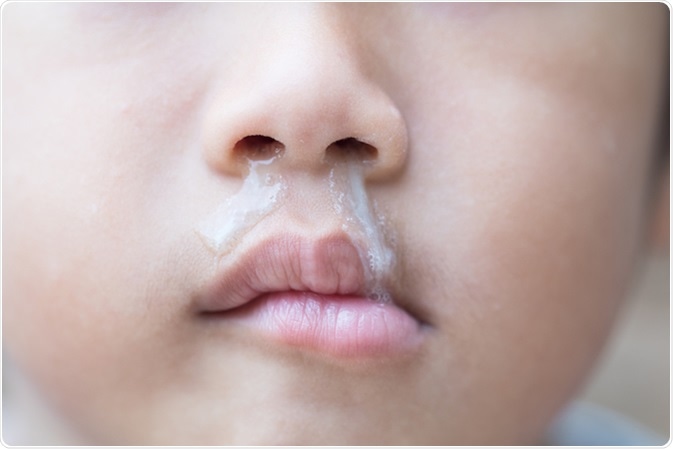Rhinorrhea is one of the chief symptoms of rhinitis, but may also be due to other serious causes. Rhinitis may be allergic or non-allergic.
Allergic rhinitis is a condition in which there is mucosal inflammation of the nose, due to IgE-mediated hypersensitivity to some component of the environment. It is caused by histamine release from the mast cells of the nasal mucosa, along with eosinophilic degranulation, but the latter may cause damage to nasal tissue.
Both an immediate and a late phase of allergy have been described, but the late phase is characterized by nasal congestion rather than rhinorrhea.

Rhinorrhea or rhinorrhoea is a condition where the nasal cavity is filled with a significant amount of mucus fluid. Image Credit: Treetree / Shutterstock
Allergic Rhinitis
The triggers for allergic rhinorrhea are diverse, and include pollen, dander, nicotine, other substances in tobacco smoke, formaldehyde and sulfur dioxide, as well as capsaicin, the substance in chili peppers that induces running of the nose after consumption.
This neuronal reaction is mediated by acetylcholine released from the parasympathetic fibers innervating the mucosal glands and vasculature.
Eosinophilic activation inhibits the muscarinic M2 receptors and leads to an increase in acetylcholine levels, causing an outpouring of gland secretions.
Nonallergic Rhinitis
Nonallergic rhinitis (NAR) presenting with rhinorrhea occurs after exposure to a change in climatic conditions or caustic smells, tobacco smoke or change in air pressure. It may have diverse presentations such as senile rhinitis, rhinitis medicamentosa, and non-allergic rhinopathy.
CSF Rhinorrhea
CSF rhinorrhea is the result of a dural puncture near the nose or sinuses, or ear. It may occasionally be spontaneous, or follow trauma or surgery to the head, nose, or ear.
Management
The condition is easily diagnosed in most cases by the clinical history and examination. Treatment of allergic rhinitis is best accomplished by avoiding allergens, as well as by the use of medications such as antihistamines, which inactivate the H1 receptors.
First generation antihistamines cause significant sedation by crossing the blood-brain barrier, and they also act on the muscarinic receptors, causing dryness of mouth, urinary retention and constipation.
Second-generation antihistamines in this category also act by inhibiting the receptor, but also have anti-inflammatory and anti-allergic activity. They have more selective action, cause less or no sedation, and act faster, but with longer duration of action.
Topical or intranasal H1-antihistamines act fastest of all and have equal or more effectiveness with regard to local symptoms than oral preparations. Topical steroids are the most effective medications and are usually safe for use even over the long term. Systemic steroids are not usually required.
Other medications include cromones, anticholinergic drugs such as ipratropium bromide, and leukotriene receptor antagonists. Omalizumab is still experimental in this condition.
Subcutaneous immunotherapy is preferable in many cases to medical treatment as it offers a durable and root-based therapy. Sublingual routes have also been attempted, and have a much lower risk of anaphylaxis.
NAR treatment also comprises avoidance of known triggers such as strong odors and pollutants, which irritate the nasal mucosa. Oral antihistamines of the first generation are somewhat effective, but not second-generation, because they lack anticholinergic action.
The most effective treatment is topical, with either antihistamines such as azelastine, intranasal steroids, or anticholinergics such as topical ipratropium bromide alone or with intranasal corticosteroids. Nasal lavage with saline solution is very useful if given just before the administration of ipratropium and corticosteroids in combination.
Experimental therapies include capsaicin, silver nitrate, and acupuncture. Surgery is used as a last resort if medical therapy is fruitless or if there are other indications for nasal surgery.
References
- https://www.ncbi.nlm.nih.gov/pmc/articles/PMC3121056/
- http://www.umm.edu/health/medical/reports/articles/allergic-rhinitis
- http://www.nyee.edu/patient-care/otolaryngology/rhinology/sinusitis-surgery/csf-rhinorrhea
- https://medlineplus.gov/ency/article/003049.htm
Further Reading
Last Updated: Feb 27, 2019